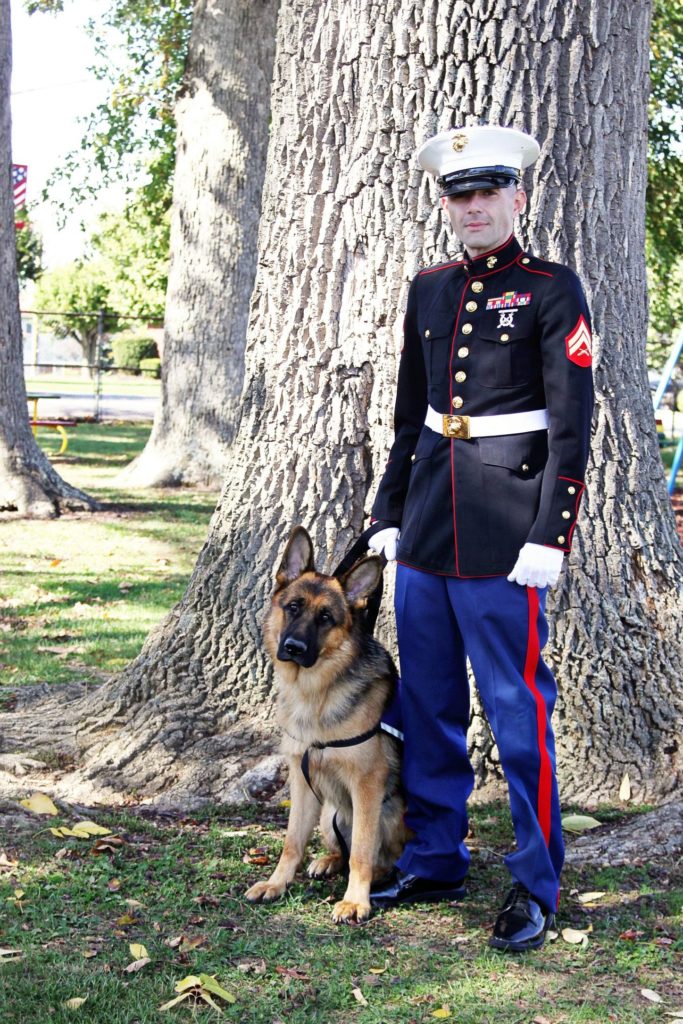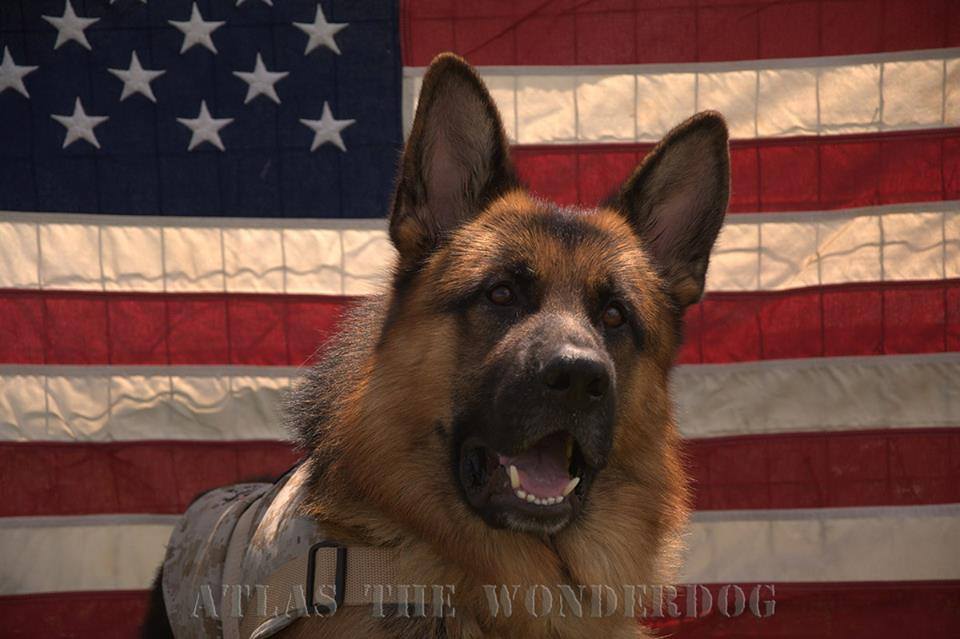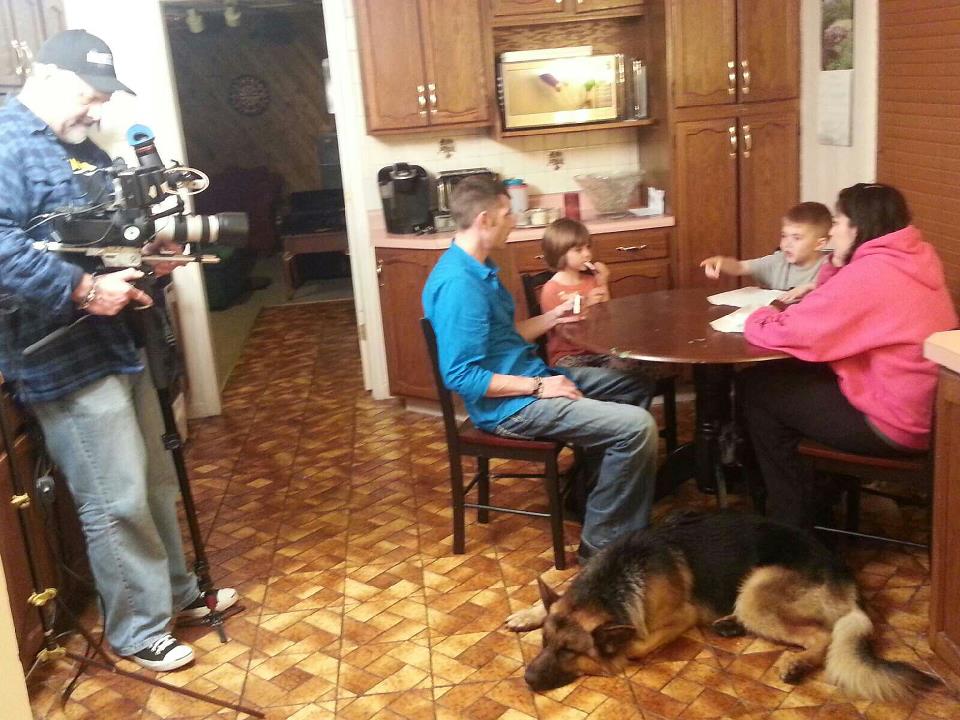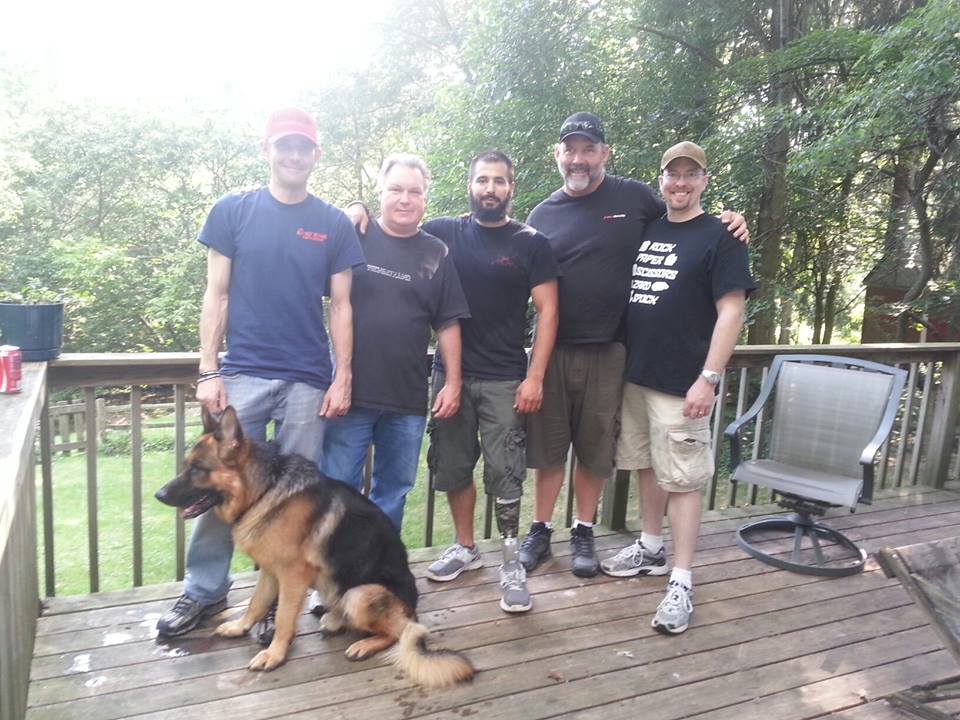Kenny Bass, like so many veterans, came back to the States no longer whole. While his outward appearance hadn’t changed, inside he was fighting demons on a daily basis.

Bass was wounded by a roadside bomb during a counter-ambush patrol in the Iraq War, his struggles with Post-Traumatic Stress Disorder, Behcet’s Disease and a broken VA system motivate him to help his brothers- and sisters-in-arms find the support they need to survive a life after combat. Diagnosed as 100% disabled by the age of 23, Kenny found himself in a downward spiral before being assigned his service dog Atlas.

After experiencing first-hand what a life saver and changer a dog can be, Bass founded The Battle Buddy Foundation, which provides highly trained psychiatric and mobility service dogs to veterans of all eras suffering from Post-Traumatic Stress Disorder (PTSD), Traumatic Brain Injury, and physical limitations. The Battle Buddy Foundation is the only organization of its kind founded by Veterans to serve Veterans.
iHeartDogs.com interviewed Bass about The Battle Buddy Foundation and his upcoming role in KCET and Link TV’s upcoming veterans with PTSD documentary called, “Searching For Home: Coming Back From War.”
How did you learn about PTSD dogs?
KB: I first learned about service dogs for Post-Traumatic Stress through my VA counselor. After making the decision that I wanted off the 33 pills a day regiment the VA had me on to treat my symptoms of PTSD and relying solely on the different counseling options through the VA, it was obvious I needed more assistance on a daily basis to manage my symptoms. So my counselor prescribed a service dog, and I began the process of researching to find the right organization to meet my specific needs.
Where did you get Atlas?
KB: The best option I found was an organization based out of Syracuse, NY. It was an organization founded by a Vietnam Era Marine, utilizing German Shepherds with championship bloodlines, and also
was on the lower end of the price ranges I had found for service dogs. From all of the different organizations I had researched, the prices ranged anywhere from $10,000 to $60,000 for a fully trained service dog, specially trained for my specific needs. Atlas’ initial price was $15,000.
What was the process to get him like?
KB: After making the decision to move forward with the process of obtaining Atlas, I had to figure out how I would actually pay for him. My younger brother had decided to create a crowdfunding page for Atlas and I, asking people to donate and help me purchase Atlas. Initially I was convinced that people wouldn’t be willing to contribute to the purchase of such an expensive dog, especially due to the fact that I had “invisible wounds”, and my injuries weren’t readily visible. Fortunately I was wrong. We had initially raised over $3000 in two weeks of fundraising, which funded the initial down payment, and the travel to Syracuse to be paired with Atlas. That was followed by two years of slowly continuing the fundraising process until Atlas was paid off, including a reduction in the total price, by $5000 so I could pay him off sooner. This occurred while simultaneously creating the foundation of The Battle Buddy Foundation, so other disabled combat veterans like myself, could receive the service dogs they need, without the high costs, or complicated process involved.
Do feel there is a “stigma” against Atlas?
KB: I don’t feel there is any sort of stigma against Atlas. People seem to be accepting and impressed when they ask me about what he is for, or why I have him. In general there tends to be an overall lack of understanding about service dogs, and their access rights etc. Service dog access, and rights, as well as Post-Traumatic Stress, Traumatic Brain Injuries and other veterans issues are all subjects that we work to educate and address with corporations, law enforcement agencies, schools, and the general public nationwide.
For those who may not believe in PTSD service dogs, what would you say to them? How has Atlas affected your life?
KB: Right now, according to the VA’s most recent Suicide Data reports, we lose an average of 22 veterans EVERY DAY to suicide, (www.va.gov Page #18, Figure 3). Since 1999, we have lost more veterans to suicide than to combat operations in both Iraq and Afghanistan combined. Currently the VA hospital’s most common answer for veterans with PTSD and other combat related issues, are piles of medications, and talk therapy. At one point during my treatment, before receiving Atlas, I was swallowing about 33 pills on a daily basis. Many of those pills are listed as having a side effect of “increased risk of suicidal thoughts”. Is there really any question as to why the suicide rate is so high?

When I first looked into getting a service dog, I thought it would be great to help keep people away from me, (and allow me to continue with my anti-social tendencies) when I was out in public, and I couldn’t have been more wrong. If anything, it caused me to interact with people more when in public. People stopping me to talk about my service dog, my service as a Marine, to thank me.
Ultimately it completely changed my outlook on the relationship between veterans, and the average civilian.
- Having a service dog that is specifically trained to help mitigate many of the symptoms that I was prescribed medications for creates tangible benefits in my daily life. My quality of life has increased exponentially since being paired with Atlas.
Having a service dog trained to interrupt nightmares, allows me to sleep without as much anxiety or worry about being awoken in a sweat, dreaming about being blown up in the desert. - Having a service dog that is trained to watch my back in public places, and alert me if someone is approaching from behind, trained to ‘block’, and ensure the integrity of my personal space is kept intact, allows me to lower my guard, and decreases my level of hypervigilance, giving me the opportunity to focus on the conversations or tasks at hand.
- Having a service dog, my battle buddy and best friend, who is trained to recognize my increasing levels of anxiety or anger, and then interrupt and redirect at those points, is absolutely life changing.
To never again be left alone with my troubling thoughts or depressed moods
To have a reason to get out into the sunshine and throw the ball, or take a walk with my buddy, to have a best friend at my side who embodies unconditional love, I really cannot imagine any better way to deal with the struggles of returning home from combat.
Why did you start The Battle Buddy Foundation?
KB: While doing the initial fundraising for Atlas, I had reached out to one of my best friends that I had served with while in the Marine Corps, Joshua Rivers. At one point he has asked me if, once I had finished working to fund Atlas, I had considered continuing the work, and helping other veterans in need. It was at that point that I realized that there had been a purpose to all of the pain and struggle that my family and I had endured over the previous 8 years since returning from Iraq. I had felt completely worthless, had considered suicide multiple times, and thought that my life was so far off track, I could likely never recover. Instead, there was a reason for all of it – it was so I could not only genuinely relate to, but also help, those other veterans who were struggling with the same things that I had survived and made it through.

After seeing firsthand how difficult it can be to navigate the process of obtaining a service dog, how little information there was on the process and seeing how many organizations there were out there that had many different focuses, none of which seemed to be the veterans themselves, it became apparent that there needed to be an organization that was “Founded by Veterans to Serve Veterans”. Now our purpose is to work to create an opportunity for long term and tangible change in the lives of veterans and their families, alongside a battle buddy service dog.
Kenny Bass and Atlas will appear in a new documentary from Executive Producer Anthony Edwards (“ER”) and Director Eric Christiansen (“Homecoming: A Vietnam Vets Journey”), called “Searching For Home: Coming Back From War.” It will air on Veterans Day (Nov. 11) at 9 p.m. PT on KCET in Southern California and at 9 p.m. ET/PT nationally on Link TV (DirecTV Channel 375 and Dish Network Channel 9410).
KCET and Link TV gave the following clip exclusively to iHeartDogs.com to share with our readers. The clip gives you just a small look into Bass’s life and the impact Atlas had on him and his family.
How To Get Involved
Whether you are a veteran or a civilian, you can help The Battle Buddy Foundation in their quest to reduce the “22 a day” number. Funding is their biggest hurdle, Bass says, so donations or fundraising events are always welcome. They also have volunteers.
The Fundraising and Volunteer applications are available on our website at www.tbbf.org and people can email us at support@tbbf.org if they have specific questions.
